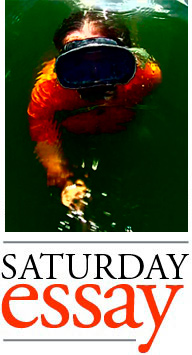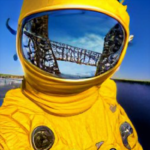What if the South Shore was a mountain range?
 A study/position paper by the Institute for the Study of Light and Water.
A study/position paper by the Institute for the Study of Light and Water.
Any mountain building on the South Shore is to be opposed. A positive feature of Duluth’s view of Lake Superior is that Wisconsin is barely there. Lake Superior takes up almost half your view; Wisconsin (being flat) is just a thin strip between the lake and the sky. So the sky basically sits right on top of the lake. From our quaint hillside, we gaze over Lake Superior and down upon Wisconsin, that piteous, benighted state. Wisconsin presents a thin band of color: green in summer, fall colors in autumn, white or gray or brown in winter. It contains flecks of texture. But it contributes so little to the view overall, one might wish for the visual interest a mountain range could provide.
But there are benefits to Wisconsin being flat. One of those benefits is that on clear days, the sunrise immediately strikes the water with that intense glittering effect, the blinding mirror of the morning lake. But what if Wisconsin had mountains? What if, instead of an unobstructed view of the sky, the South Shore had a mountain range?
The sun would remain hidden for longer in the day as it worked to clear the mountaintops. Duluth would remain in the shadow of night for longer. The sky would light up after dawn, but direct sunlight would not fall upon our city until late morning or early afternoon. The sun would gradually light the face of the mountains as it ascended, passing over the lake on its way to set behind Duluth. The changing light of day would make the mountains the visual focus. Backlit in morning, full color at noon with purples and greens and white snow, lengthening shadows, salmon pink at dusk. Without mountains, the lake has our full attention. In other words, if the South Shore had a mountain range, it would be a little pretentious.
Mountains would also block the moonrise. When the moon first rises on clear nights, it pops above Wisconsin looking orange and oblong because of the atmospheric distortion. If the water is calm enough, the moon reflects upon it all night. Mountains, while magnificent, would ruin our moonrises.
The flatness of Wisconsin is the flatness of the desert. The effect enbiggens the sky. Painters like Georgia O’Keefe moved to the desert for the big sky. The sky is a canvas of shifting color and form; a big sky is a big canvas. The landscape beneath a big sky is a complementary hemisphere; in Duluth the effect is enhanced because we’re on a hillside elevation, which expands the lake in our visual field. The lake then reflects that big sky, contributing co-equally to the living play of color. The lake and the sky are like a yin and yang, with Wisconsin the line between them. Such balance would only get complicated if things like mountains started popping up. Keep your eyes peeled for any mountain-building proposals.
Conclusion
If Wisconsin’s South Shore of Lake Superior were a mountain range, although it would be spectacular in its own right, it would have drawbacks. Duluth would be darker, and the sky would be smaller. The lake would still function as a the world’s biggest reflecting pool, but it would be darker for a larger percentage of the day. In winter, the effect would be extreme on our already-truncated daylight hours.
Corresponding to less direct sunlight, Duluth’s average daytime temperature would fall year-round. Air currents would be different, resulting in either greater or lesser annual precipitation, etc. Cloud cover would increase. The ecology would change. Different fauna and flora would attend to altitudes not currently available to them, and this would have knock-on effects within the tri-state area. If the Wisconsin mountain range had active volcanism, additional negative effects would be felt.
And the city of Superior, Wisconsin would be a mountain city looking down on Duluth, as Duluth currently looks down on it. We would gaze up at their lights, and dream of living there. This reversal would be unacceptable.
An index of Jim Richardson’s essays may be found here.
Recommended Links:
Leave a Comment
Only registered members can post a comment , Login / Register Here














No Comments